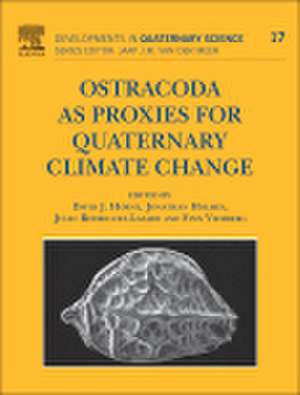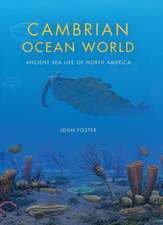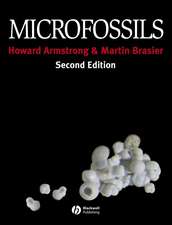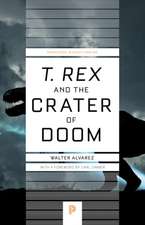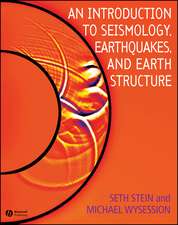Ostracoda as Proxies for Quaternary Climate Change: Developments in Quaternary Science, cartea 17
David Horne, Jonathan Holmes, Finn Viehberg, Julio Rodriguez-Lazaroen Limba Engleză Hardback – 20 dec 2012
- In-depth and focused treatment of palaeoclimate applications
- Provides durable benchmark and guide for all future work on ostracods
- Presents new, cutting-edge science
Preț: 917.46 lei
Preț vechi: 1194.86 lei
-23% Nou
Puncte Express: 1376
Preț estimativ în valută:
175.61€ • 190.82$ • 147.61£
175.61€ • 190.82$ • 147.61£
Carte tipărită la comandă
Livrare economică 14-28 aprilie
Preluare comenzi: 021 569.72.76
Specificații
ISBN-13: 9780444536365
ISBN-10: 0444536361
Pagini: 376
Dimensiuni: 216 x 276 x 25 mm
Greutate: 1.16 kg
Editura: ELSEVIER SCIENCE
Seria Developments in Quaternary Science
ISBN-10: 0444536361
Pagini: 376
Dimensiuni: 216 x 276 x 25 mm
Greutate: 1.16 kg
Editura: ELSEVIER SCIENCE
Seria Developments in Quaternary Science
Public țintă
This book will be of interest to academics in many fields, such as biology, geology, paleontology, natural history and the environmental sciences/climate change in general. Primarily, of course, it will be a standard work of reference for any scientist working on fossil or Recent ostracods.Cuprins
Part 1. Introduction to Quaternary and living ostracods
1. A general introduction to ostracods: morphology, distribution, fossil record and applications
2. The ecology of Ostracoda across levels of biological organisation from individual to ecosystem: a review of recent developments and future potential
Part 2. Ostracods as palaeoclimate proxies: ecological and biogeographical approaches
3. Ostracod taxa as palaeoclimate indicators in the Quaternary
4. Quantitative transfer function approaches in palaeoclimatic reconstruction using Quaternary ostracods
5. Mutual climatic range methods for Quaternary ostracods
6.The biogeography and physicochemical characteristics of aquatic habitats of freshwater ostracods in Canada and the United States
7. Distribution of freshwater ostracods in the Canadian North and implications for palaeoclimate reconstructions
Part 3. Ostracods as palaeoclimate proxies: geochemical approaches
8. The chemical composition of ostracod shells: applications in Quaternary palaeoclimatology
9. The calibration of environmental controls on trace element ratios in ostracod shell calcite: A critical assessment
10. Biological and environmental controls on isotopes in ostracod shells
Part 4. Multi-proxy approaches to Quaternary palaeoclimate studies
11. The versatility of Quaternary ostracods as palaeoclimate proxies: comparative testing of geochemical and ecological/biogeographical approaches
12. Ostracods as indicators of climatic and human-influenced changes in the Late Quaternary of the Ponto-Caspian region (Aral, Caspian and Black seas)
13. Geochemical and palaeoecological analyses of Mid Pleistocene to Holocene ostracod assemblages from Valle di Castiglione (Italy): palaeoenvironmental and palaeoclimatic assessment
14. Climate Variability during the Medieval Climate Anomaly and Little Ice Age based on ostracod faunas and shell geochemistry from Biscayne Bay, Florida
15. Quaternary ostracods from the Tibetan Plateau and their significance for environmental and climate-change studies
16. Holocene lake level changes of Lake Nam Co, Tibetan Plateau, deduced from ostracod assemblages and δ18O and δ13C signatures of their valves
Part 5. Future development: potential and limitations of ostracods in Quaternary palaeoclimatology
17. Palaeogenetics for ostracods (Crustacea, Ostracoda)
18. Ostracoda as proxies for Quaternary climate change: overview and future prospects
1. A general introduction to ostracods: morphology, distribution, fossil record and applications
2. The ecology of Ostracoda across levels of biological organisation from individual to ecosystem: a review of recent developments and future potential
Part 2. Ostracods as palaeoclimate proxies: ecological and biogeographical approaches
3. Ostracod taxa as palaeoclimate indicators in the Quaternary
4. Quantitative transfer function approaches in palaeoclimatic reconstruction using Quaternary ostracods
5. Mutual climatic range methods for Quaternary ostracods
6.The biogeography and physicochemical characteristics of aquatic habitats of freshwater ostracods in Canada and the United States
7. Distribution of freshwater ostracods in the Canadian North and implications for palaeoclimate reconstructions
Part 3. Ostracods as palaeoclimate proxies: geochemical approaches
8. The chemical composition of ostracod shells: applications in Quaternary palaeoclimatology
9. The calibration of environmental controls on trace element ratios in ostracod shell calcite: A critical assessment
10. Biological and environmental controls on isotopes in ostracod shells
Part 4. Multi-proxy approaches to Quaternary palaeoclimate studies
11. The versatility of Quaternary ostracods as palaeoclimate proxies: comparative testing of geochemical and ecological/biogeographical approaches
12. Ostracods as indicators of climatic and human-influenced changes in the Late Quaternary of the Ponto-Caspian region (Aral, Caspian and Black seas)
13. Geochemical and palaeoecological analyses of Mid Pleistocene to Holocene ostracod assemblages from Valle di Castiglione (Italy): palaeoenvironmental and palaeoclimatic assessment
14. Climate Variability during the Medieval Climate Anomaly and Little Ice Age based on ostracod faunas and shell geochemistry from Biscayne Bay, Florida
15. Quaternary ostracods from the Tibetan Plateau and their significance for environmental and climate-change studies
16. Holocene lake level changes of Lake Nam Co, Tibetan Plateau, deduced from ostracod assemblages and δ18O and δ13C signatures of their valves
Part 5. Future development: potential and limitations of ostracods in Quaternary palaeoclimatology
17. Palaeogenetics for ostracods (Crustacea, Ostracoda)
18. Ostracoda as proxies for Quaternary climate change: overview and future prospects
